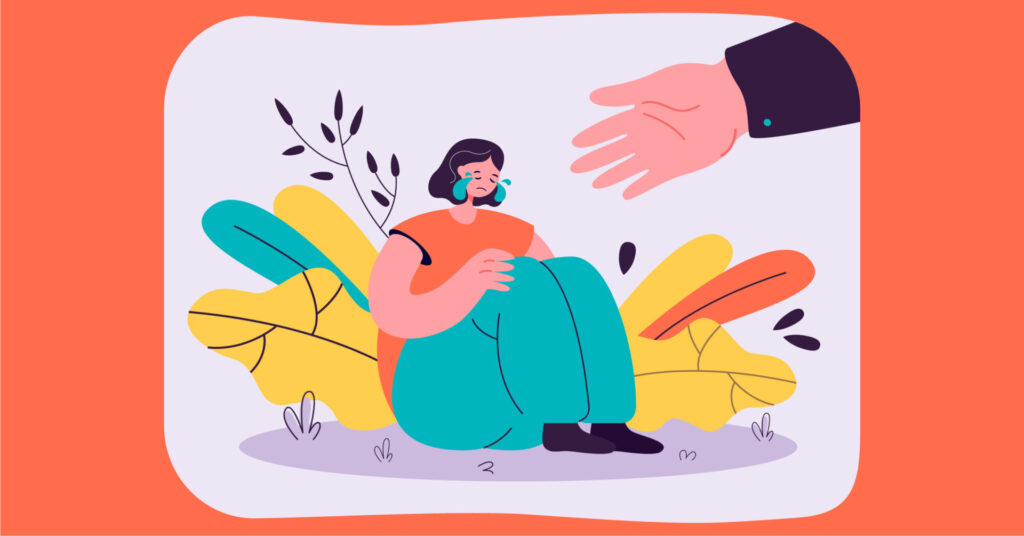The emotion of loneliness has many roots. In the following write-up we have compiled the various causes of loneliness and its impact on an individual’s physical health.
As far as character tropes go, ‘The Loner’ is widely known – characterized as an individual who is rarely seen in anyone’s company other than their own. Let’s think about this trope for a while. Even though the choice of solitude can be a rational personal preference, it is rarely regarded as such. Loners are often considered to be unsatisfied, and their choice of solitude may be misattributed to maladaptive social patterns.
Why is it that we consider people who are alone to be at a disadvantage? Humans are regarded as “social animals”, but it is true that we are also capable of enjoying our own company.
Such is the difference between objective and subjective loneliness, or loneliness and solitude. While they are both correlated, they must not be assumed to have a causative relationship; We can feel lonely in a crowd and yet completely satisfied all on our own. John Cacioppo, who conducted extensive research on loneliness from a social neuroscientific perspective, mentioned in his book ‘Loneliness: Human Nature and the Need for Social Connection’ that it is not merely being alone, but the experience of loneliness that should be considered in a potentially problematic context.
Loneliness is not a novel phenomenon – in fact, loneliness may be thought of as one of the most common phenomena experienced by us as human beings. We all feel lonely from time to time. Moving to a new city after leaving one’s friends and family behind, or trying to adapt to a new workplace full of unknown people. These experiences of loneliness can also act as motivating factors, pushing us to make social connections in new settings. Cacioppo refers to loneliness as “social pain”, and illustrates its ability to protect us from the danger of social isolation by comparing it to physical pain.
The same way our body responds to pain by eliminating threats that are seen as dangerous to us (the instinct of our hand jerking back when it touches a flame), the pain experienced as a result of loneliness can make us rethink our social choices and be the driving force behind our maintenance of interpersonal ties.
So if loneliness is so common, why has it been researched so deeply in the last few years? What is it about the so-called “social pain” that has made scientists consider the fact that it may have hazardous effects?
This is the point where chronic loneliness comes into the picture. While reiterating the importance of viewing loneliness as a subjective experience, we can understand that loneliness may be felt even when we are among others. It is possible to start feeling alone among your peers, or even in a marriage. There are multiple factors that determine the cause of loneliness apart from social risks.
Genetic research has suggested that loneliness can actually be significantly heritable, with 35-75% heritability being demonstrated across various studies. Psychological conditions including temperamental states and traits of introversion and extraversion are often seen through genetic lenses and found to have increased risks of heritability, and the same is shown to be true for what causes loneliness as well, in that it may be passed on from parent to child.
Other neurological and biological factors have also pointed towards differences in brain structure, brain functionality, autonomic nervous system, hypothalamo-pituitary-adrenocortical (HPA) axis, and more. Studies have also suggested that individuals experiencing loneliness are more likely to negatively evaluate their own social experiences. The amygdala’s assessment of perceived social threats may vary on the basis of whether or not the individual believes they have an adequate social support system in place. This variance in threat perception, in turn, can have an effect on the likelihood of the development of anxiety disorders.

Indulge is self-care and other activities to overcome feelings of loneliness
Talk to Ananda’s therapists for emotional support
Impact on Health
Loneliness and social isolation have been found to have effects on both, physical and mental health. The effects of loneliness have been seen on cardiovascular health, and has been linked to depression, anxiety, paranoia, Alzheimer’s disease, decrease in cognitive functionality, as well as a weakened immune system. Loneliness was also associated with an increase in the circulation of cortisol, causing an elevated stress response. Studies have also linked sleep disturbances and fatigue to loneliness, with lonely people reporting less subjective refreshment even after adequate hours of sleep.
Loneliness causes individuals to likely have poorer emotional regulation. Lonely people may have trouble coping with their loneliness, which can affect their capacity to express and experience positive affect. Research has also suggested that individuals with poorer perceived social support are more prone to substance use disorders, as well as disordered eating.
Due to the aforementioned shift in social cognition, lonely people are more likely to perceive social situations negatively, and may also be more reactive to negative cues. The decrease in their ability to experience positive affect may form a cycle leading back to social isolation, which in turn results in a failure to break out of the state of loneliness.
Causes of Loneliness
There are cases of loneliness being hereditary. Although, loneliness is also acquired through external factors such as:
- Low Self-esteem
Regarding yourself as inferior is one of the aspects of low self-esteem. It is also the reason for an individual to feel worthless and undeserving of affection and inclusion. Low self-esteem eventually results in the individual withdrawing from others and isolating themselves which can cause of loneliness.
- Social Anxiety
Social anxiety instills a fear of being judged, ridiculed or embarrassed in social settings. Socially anxious individuals avoid such situations and prefer being by themselves which makes them feel left out and lonely. Unfortunately, their own anxiety has led them to what causes loneliness.
- Past Trauma
Trauma is any harmful, disturbing or frightening event that has left a physical or emotional scar. Trauma prevents the individual from associating with others. That may be due to guilt of their past, fear of being hurt again or the lack of emotional strength to deal with others. Such individuals avoid stepping out of their comfort zone and prefer their own company.
- Physical Isolation
People who live alone involuntarily, due to certain situations, have reported to feel lonely. They want to have people around them but are living alone and this troubles them. Man is a social animal, we require others for our own balanced mental health. When we lack contact with others, it affects our mood and mental health.
- Lack of Close Ones
Some people have no-one to rely on. They go through the highs and lows of life by themselves with nobody by their side. Their lack of confidants is a cause of loneliness for them.
Combating Loneliness
In ‘Loneliness: Human Nature and the Need for Social Connection’, Cacioppo puts forth a seemingly simple strategy to put social connection into perspective: freeing ourselves of negative bias. Individuals experiencing social pain, or loneliness, are likely to be burdened by their own perceived threats formulated deceivingly by loneliness, and by the stress created in the process. This burden creates a distraction from opportunities to form meaningful social connections. Being optimistic in social settings can not only help us overcome loneliness, it can also, contagiously, boost positive affect among those around us.
Even though loneliness is yet to be recognized as an official threat to public health, promising research is being carried out in the area, which has also highlighted potential measures for intervention. Encouraging community activities and organizing one-on-one buddy programs has been suggested. Greater consideration should be given to at-risk groups, which include the youth (25 years and younger) as well as the elderly (65 years and older). Joining online communities on the basis of common interests, such as book groups, multi-player gaming platforms, support groups, socializing apps, and more, can be beneficial on an individualistic level.
Tips to Prevent and Overcome Loneliness
Every individual has experienced loneliness at some point in their lives. What causes loneliness is isolation, low self-esteem, depression, divorce, loss of a loved one or as an underlying factor of a major psychological disorder.
In recent studies, the levels of loneliness in the younger generation have increased rapidly in the past few years. There are few ways to prevent and overcome this, such as
- Indulge in activities: participating in activities you enjoy help maintain your self esteem and give you opportunities to socialize with like minded people.
- Expect the best: lonely people expect rejection and settle for less. Make sure to keep your thoughts positive and desire the best for yourself.
- Strengthen relationships: your existing relationships can prove to be a safe haven if nurtured and developed.
- Talk to someone you trust: talking out your thoughts and emotions can be easier if done with someone who has gained your trust
- Spot the signs: loneliness does not set in overnight. It has physical and mental effects which can be spotted and worked on in the initial stages.
While loneliness can be difficult to overcome, recognizing a problem and taking steps to resolve it is vital. It may be difficult to reach out, but there are always people willing to help, including mental healthcare professionals. Taking the first step can go a long way.
Read More:
Grief : An Overwhelming Emotion
Teen Depression: Symptoms of Depression in Teens
10 Ways to Cope with Depression?






